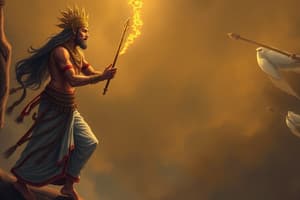Podcast
Questions and Answers
In "The Temptation of Karna," what internal conflict does Karna constantly grapple with due to his birth and societal standing?
In "The Temptation of Karna," what internal conflict does Karna constantly grapple with due to his birth and societal standing?
Karna struggles with the conflict between his noble qualities and the prejudices he faces because of his birth circumstances.
How does Karna's loyalty to Duryodhana create an ethical dilemma for him in relation to the Pandavas?
How does Karna's loyalty to Duryodhana create an ethical dilemma for him in relation to the Pandavas?
Karna's loyalty to Duryodhana places him in direct opposition to the Pandavas, who are, unbeknownst to many initially, his own brothers, thus forcing him to choose between loyalty and familial duty.
What specific promises are made to Karna when he is offered the chance to switch sides, and why does he ultimately reject these offers?
What specific promises are made to Karna when he is offered the chance to switch sides, and why does he ultimately reject these offers?
Karna is offered power, acceptance, and recognition of his true identity. He rejects these offers due to his commitment to his word and his loyalty to Duryodhana.
In "The Temptation of Karna," how does the play illustrate the tragic consequences of making choices under pressure?
In "The Temptation of Karna," how does the play illustrate the tragic consequences of making choices under pressure?
How does Shakuni's role in the dicing game exemplify the theme of adharma?
How does Shakuni's role in the dicing game exemplify the theme of adharma?
What is the significance of Yudhishthira losing Draupadi in the game of dice, and how does this event escalate the conflict between the Pandavas and Kauravas?
What is the significance of Yudhishthira losing Draupadi in the game of dice, and how does this event escalate the conflict between the Pandavas and Kauravas?
How does Krishna's intervention during Draupadi's disrobing reflect the concept of dharma?
How does Krishna's intervention during Draupadi's disrobing reflect the concept of dharma?
In the context of the dicing game, what does Yudhishthira's willingness to gamble away his kingdom and family reveal about his character?
In the context of the dicing game, what does Yudhishthira's willingness to gamble away his kingdom and family reveal about his character?
In "Abhijñānaśākuntalam," what causes Dushyanta to forget Sakuntala, and how does this plot device contribute to the play's central conflict?
In "Abhijñānaśākuntalam," what causes Dushyanta to forget Sakuntala, and how does this plot device contribute to the play's central conflict?
What is the significance of the royal ring in "Abhijñānaśākuntalam," and how does its loss and recovery affect the play's outcome?
What is the significance of the royal ring in "Abhijñānaśākuntalam," and how does its loss and recovery affect the play's outcome?
How does Kalidasa use the setting of the hermitage in "Abhijñānaśākuntalam" to contrast with the royal court, and what does this contrast reveal about the play's themes?
How does Kalidasa use the setting of the hermitage in "Abhijñānaśākuntalam" to contrast with the royal court, and what does this contrast reveal about the play's themes?
In "Abhijñānaśākuntalam," how does the character of Sakuntala embody both strength and vulnerability?
In "Abhijñānaśākuntalam," how does the character of Sakuntala embody both strength and vulnerability?
What role does nature play in "Abhijñānaśākuntalam," and how does Kalidasa use vivid descriptions to enhance the story?
What role does nature play in "Abhijñānaśākuntalam," and how does Kalidasa use vivid descriptions to enhance the story?
Considering both "The Temptation of Karna" and the dicing game from the Mahabharata, how do these narratives highlight the consequences of adhering to questionable commitments?
Considering both "The Temptation of Karna" and the dicing game from the Mahabharata, how do these narratives highlight the consequences of adhering to questionable commitments?
Compare and contrast the roles of fate and personal choice in shaping the destinies of Karna and Sakuntala.
Compare and contrast the roles of fate and personal choice in shaping the destinies of Karna and Sakuntala.
How do the themes of memory and recognition function differently in "Abhijñānaśākuntalam" compared to "The Temptation of Karna?"
How do the themes of memory and recognition function differently in "Abhijñānaśākuntalam" compared to "The Temptation of Karna?"
How does the concept of dharma, or righteousness, influence the actions and motivations of Yudhishthira and Karna?
How does the concept of dharma, or righteousness, influence the actions and motivations of Yudhishthira and Karna?
Discuss the role of divine intervention in both the Mahabharata (specifically the dicing game) and "Abhijñānaśākuntalam."
Discuss the role of divine intervention in both the Mahabharata (specifically the dicing game) and "Abhijñānaśākuntalam."
What parallels can be drawn between the societal pressures faced by Karna and the challenges Sakuntala encounters when seeking recognition from Dushyanta?
What parallels can be drawn between the societal pressures faced by Karna and the challenges Sakuntala encounters when seeking recognition from Dushyanta?
Considering the themes of loyalty, justice, and fate explored in "The Temptation of Karna," the dicing game, and "Abhijñānaśākuntalam," which character do you think faces the most complex moral dilemma, and why?
Considering the themes of loyalty, justice, and fate explored in "The Temptation of Karna," the dicing game, and "Abhijñānaśākuntalam," which character do you think faces the most complex moral dilemma, and why?
Flashcards
"The Temptation of Karna" Themes
"The Temptation of Karna" Themes
Ethical choices complicated by loyalty and circumstance, explored through Karna's life.
Karna's Internal Conflict
Karna's Internal Conflict
Karna's internal struggle as he faces prejudice and questions of identity because of his birth.
Karna's Loyalty Dilemma
Karna's Loyalty Dilemma
Karna's pledge creating a conflict between him and his brothers, the Pandavas.
Karna's Temptations
Karna's Temptations
Signup and view all the flashcards
The Dicing Game
The Dicing Game
Signup and view all the flashcards
Yudhishthira's Weakness
Yudhishthira's Weakness
Signup and view all the flashcards
Shakuni's Role
Shakuni's Role
Signup and view all the flashcards
Draupadi's Humiliation
Draupadi's Humiliation
Signup and view all the flashcards
Krishna's Intervention
Krishna's Intervention
Signup and view all the flashcards
"Abhijñānaśākuntalam"
"Abhijñānaśākuntalam"
Signup and view all the flashcards
Dushyanta's Role
Dushyanta's Role
Signup and view all the flashcards
Sakuntala's Character
Sakuntala's Character
Signup and view all the flashcards
The Royal Ring
The Royal Ring
Signup and view all the flashcards
Durvasa's Curse
Durvasa's Curse
Signup and view all the flashcards
Dushyanta's Repentance
Dushyanta's Repentance
Signup and view all the flashcards
Bharata's Significance
Bharata's Significance
Signup and view all the flashcards
Study Notes
- "The Temptation of Karna" explores themes of dharma, adharma, and moral ambiguity through the character of Karna from the Mahabharata.
- Karna, despite his noble qualities, faces constant internal conflict due to his birth circumstances and societal prejudices.
- The play delves into Karna's loyalty to Duryodhana, which puts him in direct opposition to the Pandavas, his own brothers, creating a complex ethical dilemma.
- The temptation refers to multiple instances where Karna is offered a chance to switch sides or reveal his true identity, promising him power and acceptance.
- However, Karna's commitment to his word and his friendship with Duryodhana leads him to reject these offers, even though they might offer a better, more righteous path.
- The play highlights the tragic consequences of choices made under duress and the heavy burden of upholding one's principles in a morally complex world.
The Dicing (from the Mahabharata)
- The dicing game, or game of dice, is a pivotal event in the Mahabharata that leads to Draupadi's disrobing and sets the stage for the Kurukshetra War.
- Yudhishthira, the eldest Pandava, is invited to a game of dice by Shakuni, Duryodhana's uncle, who is known for his cunning and skill in cheating.
- Yudhishthira, known for his righteousness but also his weakness for gambling, accepts the invitation, despite warnings from his family and advisors.
- In the game, Yudhishthira loses his wealth, kingdom, brothers, and eventually Draupadi, his wife, to Duryodhana and his allies.
- Draupadi is then dragged into the court and humiliated, with attempts made to disrobe her in front of everyone, an act of extreme dishonor and injustice.
- Krishna intervenes miraculously to protect Draupadi from being disrobed completely, saving her from further humiliation.
- The dicing incident exposes the deceit and malice of the Kauravas and the helplessness of the Pandavas, igniting the pent-up anger and desire for revenge that ultimately leads to the war.
- The event underscores themes of dharma, justice, and the consequences of unchecked greed and arrogance.
Abhijñānaśākuntalam (The Recognition of Sakuntala)
- "Abhijñānaśākuntalam" is a famous Sanskrit play by Kalidasa, telling the story of King Dushyanta and Sakuntala, a daughter of a sage raised in a hermitage.
- Dushyanta, while on a hunting expedition, encounters Sakuntala in the hermitage and falls in love with her.
- They marry in a secret ceremony, and Dushyanta promises to bring Sakuntala to his palace as his queen.
- Before leaving, Dushyanta gives Sakuntala a royal ring as a token of recognition.
- Due to a curse from the sage Durvasa, Sakuntala loses her memory of Dushyanta, and Dushyanta loses his memory of Sakuntala.
- When Sakuntala travels to Dushyanta's court to claim her place as queen, he fails to recognize her because of the curse.
- The royal ring, meant for recognition, is lost when Sakuntala bathes in a river.
- A fisherman later finds the ring inside a fish and presents it to the king, breaking the curse.
- Dushyanta regains his memory of Sakuntala and realizes his mistake.
- After a period of separation and repentance, Dushyanta and Sakuntala are reunited, and they eventually have a son named Bharata, after whom India is named.
- The play explores themes of love, loss, memory, duty, and redemption.
- It is celebrated for its beautiful poetry, vivid descriptions of nature, and insightful portrayal of human emotions.
Studying That Suits You
Use AI to generate personalized quizzes and flashcards to suit your learning preferences.




